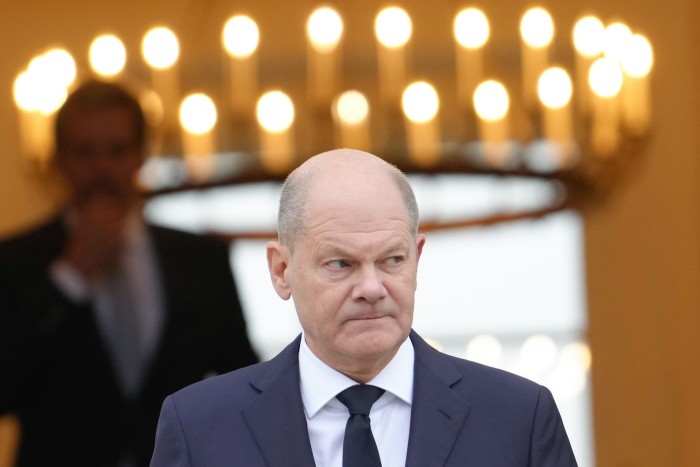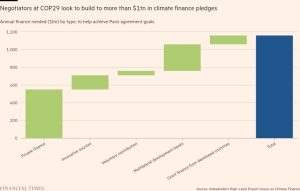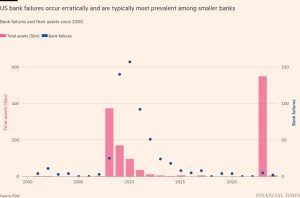Will Friedrich Merz get Germany to abandon its fiscal fetish?

On paper, the man widely seen as Germany’s next chancellor is fully committed to the “debt brake” that places strict caps on government borrowing — and that caused the ruling coalition’s dramatic collapse.
But Friedrich Merz, leader of the opposition Christian Democratic Union that is topping opinion polls ahead of snap elections, could quickly find the fiscal straitjacket too suffocating.
With Germany facing failing railways and crumbling schools, under-equipped armed forces and an ailing economy that risks being further hit by US tariffs under Donald Trump, prominent business leaders and economists are warning that the rule must be changed to spur investment and boost growth.
“We need to invest large amounts quickly,” said Jens Südekum, professor of international economics at Düsseldorf’s Heinrich Heine University. “That is impossible with the current debt brake.” Without a reform of the rule, he said, “Germany will become impossible to govern”.
The implosion of Scholz’s three-way government has prompted fresh questions at home and also in Europe, where Germany has long played the role of fiscal policeman, about the wisdom of the debt brake.
Supporters say it ensures economic stability and “sets an example” to other nations. But critics describe it as a deeply unhelpful “fetish”, or even a “threat to democracy”, pointing to studies showing that under-investment can fuel the rise of political extremism.
The CDU, which along with the CSU, its Bavarian sister party, is on track to come first in Germany’s looming elections, has always been a proud defender of the schwarze Null, or “black zero”, that represents a balanced budget.
Its party platform says the debt brake secures sustainable finances for “our children and grandchildren”. A popular meme shared by party activists features a black nought wearing a black leather cap and the words: “We stand by our fetish.”
Oldie but Goldie: Wenn man unseren Kampf für Generationengerechtigkeit durch solide Finanzen einen Fetisch nennt, dann sind wir die stolzesten Fetischisten Deutschlands! #wegenmorgen #schwarzeNull #Schlussrunde #Laschetmachet pic.twitter.com/E8B1UysyWP
— CDU Deutschlands (@CDU) September 23, 2021
Still, Merz has not completely shut down the possibility of reforming the debt brake. “In politics, nothing is ever completely ruled out,” he said on Friday when asked about it on public radio.
The Schuldenbremse was enshrined in the German constitution in 2009 by then chancellor Angela Merkel — a CDU politician — in a bid to force responsible borrowing after government debt jumped from 63 per cent of GDP to 81 per cent after the global financial crisis.
The rule limited the federal government’s structural deficit to 0.35 per cent of GDP, adjusted for the economic cycle.
The concept is guarded by the German constitutional court, which last year struck down the government’s borrowing plans and created a €60bn budget hole, triggering a crisis that Scholz’s coalition was unable to overcome.
Since then, the clamour for reform has grown louder, even among fiscal hawks such as the German central bank and the country’s influential business lobby, the BDI.
Leaders in some of Germany’s 16 federal states, who have in effect been barred from running any kind of deficit since 2020, have also voiced their anger. Kai Wegner, the mayor of cash-strapped Berlin, has said that Germany had been “ruined by austerity”.
Experts disagree on precisely how much Germany will need to borrow over the next decade to decarbonise its polluting industry, invest in defence and boost military aid to Ukraine, especially as US assistance is expected to cease once Trump is sworn into office.
Lars Feld, a professor of economics at the University of Freiburg and a staunch debt brake defender, said there was “no need for meddling” with the rule, as he estimated that Germany’s additional financing needs over 10 years would amount to some €400bn, less than this year’s annual budget.
But Dezernat Zukunft, a think-tank founded by young economists who make the case for reform, said in a recent report Germany needed to spend about €780bn between now and 2030. Max Krahé, one of the authors, argues that it would be impossible to find such sums without “very aggressive” spending cuts, including to the pensions system, which Merz appears unwilling to do.
Economists point out that there is much that can already be done within the current rules, which allow governments to borrow more during downturns. Another provision allows the debt brake to be suspended in emergencies. Scholz unsuccessfully tried to persuade his finance minister Christian Lindner to use it, arguing the war in Ukraine met the definition.
Merz, a former chair of BlackRock Germany, could establish a new special investment fund similar to a €100bn pot Scholz set up in 2022 to overhaul the German armed forces after Vladimir Putin’s full-scale invasion of Ukraine. That would require a change in the constitution but would leave the wording of the existing debt brake intact.
Others have advocated changing the text of the rule itself to make it more flexible. Germany’s Council of Economic Experts said that the current rule was “more rigid than necessary” and floated the idea of adjusting the 0.35 per cent structural deficit limit so that the government could borrow more depending on the overall debt-to-GDP ratio of any given year.

This year the ratio is expected to be 64 per cent, with a budget deficit of 1.75 per cent of GDP — well within the EU limit of 3 per cent.
Amending the constitution, however, would require a two-thirds majority in the Bundestag. Merz is most likely to enter a coalition with either Social Democrats or the Greens, both debt brake sceptics. But it is unclear if he would be able to command the necessary supermajority if the far-right Alternative for Germany and the far-left Sahra Wagenknecht Alliance were to win more than a third of the seats in parliament.
Pushing the boundaries of the existing framework, meanwhile, risks once again being struck down by the top court.
In interviews, Merz has tried to avoid boxing himself in on the debt brake issue, arguing that the top priority should be improving the business climate and “getting a grip” on social spending. “If we get the overall concept under control, then we can talk about reforming the debt brake, but not about abolishing it,” he told a meeting of party officials last week.
Krahé, from Dezernat Zukunft, said a national conversation was necessary that included not just CDU politicians but also legal scholars and constitutional judges. He said: “Maybe at the end of the next government we will know whether a more openly-interpreted debt brake works — or whether we need constitutional reform.”
The outcome of the debate will have far-reaching implications beyond Germany’s borders. It comes as Brussels pushes EU member states to make sweeping policy changes and increase investments to fix the bloc’s flagging economic competitiveness versus global rivals such as the US and China.
With the EU talking in terms of hundreds of billions in additional investment, potentially through a larger shared budget or new joint debt, officials admit it will all hinge on the ability of Germany — the bloc’s biggest economy and largest financial contributor — to spend more.
“It’s essentially a political decision in Germany,” said one official. “And the other 26 [member states] are all waiting for it.”
Additional reporting by Henry Foy in Brussels
#Friedrich #Merz #Germany #abandon #fiscal #fetish







